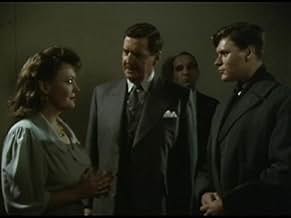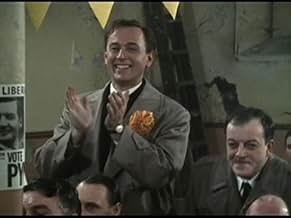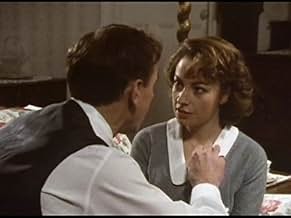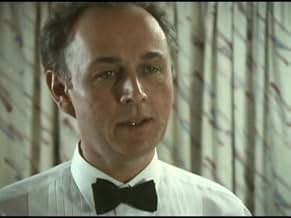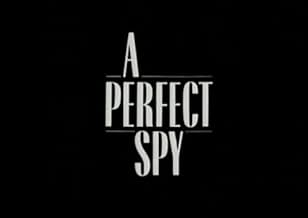A Perfect Spy
- Miniserie de TV
- 1987
- 6h 14min
CALIFICACIÓN DE IMDb
7.3/10
1.1 k
TU CALIFICACIÓN
Magnus Pym y su carrera a través de los servicios de inteligencia. Desde encuentros fortuitos con personas que serán importantes para él en el futuro hasta una vida en Checoslovaquia.Magnus Pym y su carrera a través de los servicios de inteligencia. Desde encuentros fortuitos con personas que serán importantes para él en el futuro hasta una vida en Checoslovaquia.Magnus Pym y su carrera a través de los servicios de inteligencia. Desde encuentros fortuitos con personas que serán importantes para él en el futuro hasta una vida en Checoslovaquia.
- Nominado a 2 premios Primetime Emmy
- 1 premio ganado y 6 nominaciones en total
Explorar episodios
Opiniones destacadas
This is my second time through for A Perfect Spy. I watched it 2 or 3 years ago and liked it. I like it still. It's natural that it gets compared to the beeb's other big Le Carre' series, Tinker Tailor Soldier Spy. Tinker Tailor focuses on the "game" spies play; Perfect Spy gives us the other axis - what kind of person a spy is. There are a number of themes that these movies share, along with others in the genre.
Ambiguity - moral, sexual, interpersonal - which creates a multidimensional space of true vs. false, inside vs. outside, love vs. responsibility. In a way, these characters are happiest when they are being treated the most shabbily by those they love and respect - "backstabbed" in its various nuances.
The theme of fathers and father-figures is also important. One of the most intriguing characters in A Perfect Spy is Rick, the main character Magnus' perhaps ersatz father. Throughout the story he betrays and is betrayed. A rogue who always manages to climb back up the ladder when he's been toppled, who seems impervious to what others think of him, asks Magnus each time they meet, "Do you love your old man?" and never, "Do you love me?" Maybe it says this somewhere else, but A Perfect Spy is a love story.
Another theme is that of malignancy. The nature of the business is to turn others - turn them against their government, against their friends and associates, turn them against their values and beliefs. In each of the Le Carre' movies I have seen, The Spy who Came in From the Cold, Looking Glass War, Tinker Tailor Soldier Spy, Smiley's People, and A Perfect Spy, turning and being turned is the foundation of the tragedy.
Finally, not so much a theme as an artistic touch - in each of these films there is usually only a single gun shot, or perhaps two shots bookending the story. Violence, torture, cruelty are always just beneath the surface. We see their results not as streams of blood or dank prison cells but in the the objects Le Carre''s characters cling to as they are ineluctably sucked down into the morass.
If you haven't seen the films above, and you enjoy A Perfect Spy, you are in for a treat. I'd also recommend The Sandbagger series (Yorkshire TV), the 2nd and 3rd seasons of which begin to reach the level of this kind of complexity. The IPCRESS File and Burial in Berlin are nice, though light weight. For political intrigue try A Very British Coup, House of Cards and Yes, Minister/Yes, Prime Minister.
If only a brit would set his hand to making The Three Kingdoms - there would be a film with intrigue and complexity.
Ambiguity - moral, sexual, interpersonal - which creates a multidimensional space of true vs. false, inside vs. outside, love vs. responsibility. In a way, these characters are happiest when they are being treated the most shabbily by those they love and respect - "backstabbed" in its various nuances.
The theme of fathers and father-figures is also important. One of the most intriguing characters in A Perfect Spy is Rick, the main character Magnus' perhaps ersatz father. Throughout the story he betrays and is betrayed. A rogue who always manages to climb back up the ladder when he's been toppled, who seems impervious to what others think of him, asks Magnus each time they meet, "Do you love your old man?" and never, "Do you love me?" Maybe it says this somewhere else, but A Perfect Spy is a love story.
Another theme is that of malignancy. The nature of the business is to turn others - turn them against their government, against their friends and associates, turn them against their values and beliefs. In each of the Le Carre' movies I have seen, The Spy who Came in From the Cold, Looking Glass War, Tinker Tailor Soldier Spy, Smiley's People, and A Perfect Spy, turning and being turned is the foundation of the tragedy.
Finally, not so much a theme as an artistic touch - in each of these films there is usually only a single gun shot, or perhaps two shots bookending the story. Violence, torture, cruelty are always just beneath the surface. We see their results not as streams of blood or dank prison cells but in the the objects Le Carre''s characters cling to as they are ineluctably sucked down into the morass.
If you haven't seen the films above, and you enjoy A Perfect Spy, you are in for a treat. I'd also recommend The Sandbagger series (Yorkshire TV), the 2nd and 3rd seasons of which begin to reach the level of this kind of complexity. The IPCRESS File and Burial in Berlin are nice, though light weight. For political intrigue try A Very British Coup, House of Cards and Yes, Minister/Yes, Prime Minister.
If only a brit would set his hand to making The Three Kingdoms - there would be a film with intrigue and complexity.
If Smiley's People and Tinker Tailor Spy were about the "how" of espionage, A Perfect Spy is about the "who".
Whereas the first two were essentially two long investigations, A Perfect Spy, which begins as a non-linear story line in the novel, is about the socio-psychological components of what goes into making a spy.
While those who have read the book will find this adaptation surprising, it is also one of the finest. The story is linear, starting with a young Magnus, his con father, and his acolytes.
The background of the series is about the issue of what I would call inverted loyalties. Time and again, we see Magnus' relationship with his father as one where the former is criminally tolerant and indulgent, as any son with a deranged father might. During Magnus' childhood, and through his mentoring by Jack Brotherhood, we see an individual with divided loyalties, but seemingly true to both.
What this creates for the viewer is the impression that the good guys are actually bad, and vice versa, without resorting to any literary or artistic device. For example, we see immediately that Axel is initially harmless, but while he does something objectionable, nevertheless remains very attaching. For Magnus, it is the same. The buildup of his character during childhood only strengthens our sympathy for him. The reality is only revealed when Egan's character towards the end, when the Americans are catching on) starts to decompose.
To my taste, the series spends too much time on the childhood of the hero character. There are also devices taken from the book that are clearly unnecessary for the series (the green filing cabinet for example), and the relationship with Brotherhood could have been expanded, for the sake of balance with that of Axel Hampel.
Not to be sexist, but the women in the series are simply annoying. Also, their role in Magnus', Jack's professional lives and the spy craft is merely as sex-pots, which doesn't always conform to the zeitgeist. Although this was perhaps truer in the 1970s, when the novel's action was taking place. Also, some people don't seem to age, yet, they've been apparently working since the end of WW2; i.e. Jack Brotherhood, from 1947 to 1987 without a grey hair...
Overall, however, we see compelling acting. Egan, MacAnally, Weigang at the summit of their art.
The last ten minutes of the series is the finest acting ever filmed or seen.
Whereas the first two were essentially two long investigations, A Perfect Spy, which begins as a non-linear story line in the novel, is about the socio-psychological components of what goes into making a spy.
While those who have read the book will find this adaptation surprising, it is also one of the finest. The story is linear, starting with a young Magnus, his con father, and his acolytes.
The background of the series is about the issue of what I would call inverted loyalties. Time and again, we see Magnus' relationship with his father as one where the former is criminally tolerant and indulgent, as any son with a deranged father might. During Magnus' childhood, and through his mentoring by Jack Brotherhood, we see an individual with divided loyalties, but seemingly true to both.
What this creates for the viewer is the impression that the good guys are actually bad, and vice versa, without resorting to any literary or artistic device. For example, we see immediately that Axel is initially harmless, but while he does something objectionable, nevertheless remains very attaching. For Magnus, it is the same. The buildup of his character during childhood only strengthens our sympathy for him. The reality is only revealed when Egan's character towards the end, when the Americans are catching on) starts to decompose.
To my taste, the series spends too much time on the childhood of the hero character. There are also devices taken from the book that are clearly unnecessary for the series (the green filing cabinet for example), and the relationship with Brotherhood could have been expanded, for the sake of balance with that of Axel Hampel.
Not to be sexist, but the women in the series are simply annoying. Also, their role in Magnus', Jack's professional lives and the spy craft is merely as sex-pots, which doesn't always conform to the zeitgeist. Although this was perhaps truer in the 1970s, when the novel's action was taking place. Also, some people don't seem to age, yet, they've been apparently working since the end of WW2; i.e. Jack Brotherhood, from 1947 to 1987 without a grey hair...
Overall, however, we see compelling acting. Egan, MacAnally, Weigang at the summit of their art.
The last ten minutes of the series is the finest acting ever filmed or seen.
I rather liked this BBC TV adaptation of John le Carré's highly regarded book.
Very difficult to give it a rating! In the end, I've settled on 7, although some aspects warranted 8 or more.
This TV version of The Perfect Spy was aired by the BBC in 1987. It is very dated in the way it looks, the cold war spy story, the way it's told, and the way the screenplay is constructed. TV drama series just don't look like or do this anymore. It's 37 years old. Also, it's sloooow burn - a mood piece, which relies on some talking heads, tense room situations, and a sprinkling of violin music. It's OK actually! I'm of an age now where I can appreciate this sort of thing. If you want wham-blam - then you are looking in the wrong place!
Benedict Taylor, and then Peter Egan are Magnus Pym - a spy who plays for both sides. In a sense, this is not the most important thing here though. In it's place, the thing offered is that the Magnus Pym character is unmoored. He doesn't seem to have any moral code. This, in part, must be due to his father "Rick" Pym, played brilliantly by Ray McAnally. He is a crook of the worst kind, defrauding anyone he can get money out of. Because McAnally plays the father so well, we get a sense of the reverence he elicts from his son in earlier years. But he is the worst kind of role model, full of smooth emotional blackmail. I liked the way that "Rick" keeps popping up over time. In the end, confused and frustrated by his influence, Magnus tries to keep him away. It's as if Magnus is running away from him and everything he represents. But he doesn't really escape, he simply evolves into another version of his father. We see this especially towards the end. That's my interpretation anyway.
There is a lot going on in The Perfect Spy, with many relationships - most of which are damaged, manipulative and inauthentic. Perhaps the most important and defining pairing, is Magnus's lonstanding & influential friendship with Axel Hampel - a Czech agent, played wonderfully by Rüdiger Weigang.
In the end, Magnus Pym is a moral desert - a game player who never comes to terms with who he is, what he does, or why he does it.
The Perfect Spy falls down a little in a few places. We don't see what Magnus really does, and only some of the influence he really has. We find it hard to keep up with the female characters - who are often used and mistreated. There are gaps and failures to explain or give insight. Instead, we see what Magnus comes to realise only at the end....
Very difficult to give it a rating! In the end, I've settled on 7, although some aspects warranted 8 or more.
This TV version of The Perfect Spy was aired by the BBC in 1987. It is very dated in the way it looks, the cold war spy story, the way it's told, and the way the screenplay is constructed. TV drama series just don't look like or do this anymore. It's 37 years old. Also, it's sloooow burn - a mood piece, which relies on some talking heads, tense room situations, and a sprinkling of violin music. It's OK actually! I'm of an age now where I can appreciate this sort of thing. If you want wham-blam - then you are looking in the wrong place!
Benedict Taylor, and then Peter Egan are Magnus Pym - a spy who plays for both sides. In a sense, this is not the most important thing here though. In it's place, the thing offered is that the Magnus Pym character is unmoored. He doesn't seem to have any moral code. This, in part, must be due to his father "Rick" Pym, played brilliantly by Ray McAnally. He is a crook of the worst kind, defrauding anyone he can get money out of. Because McAnally plays the father so well, we get a sense of the reverence he elicts from his son in earlier years. But he is the worst kind of role model, full of smooth emotional blackmail. I liked the way that "Rick" keeps popping up over time. In the end, confused and frustrated by his influence, Magnus tries to keep him away. It's as if Magnus is running away from him and everything he represents. But he doesn't really escape, he simply evolves into another version of his father. We see this especially towards the end. That's my interpretation anyway.
There is a lot going on in The Perfect Spy, with many relationships - most of which are damaged, manipulative and inauthentic. Perhaps the most important and defining pairing, is Magnus's lonstanding & influential friendship with Axel Hampel - a Czech agent, played wonderfully by Rüdiger Weigang.
In the end, Magnus Pym is a moral desert - a game player who never comes to terms with who he is, what he does, or why he does it.
The Perfect Spy falls down a little in a few places. We don't see what Magnus really does, and only some of the influence he really has. We find it hard to keep up with the female characters - who are often used and mistreated. There are gaps and failures to explain or give insight. Instead, we see what Magnus comes to realise only at the end....
I clearly missed the joke behind this series. How does a man so gullible climb his way through the ranks of British intelligence? Maybe that was Le Carré's point; that any idiot could have been "a spy" during the cold war, and that it was exactly his stupidity that kept him unwittingly "under the radar"...Either way, I came away feeling extremely annoyed at the end.
It's been a long time since I saw this mini-series and I am happy to say its remembered merits have withstood the test of time.
Most of the components of 'A Perfect Spy', the adaptation of LeCarré's finest novel, in my opinion, are top-drawer. Outstanding aspects of it are the musical score and the masterful screenplay, the latter written by Arthur Hopcraft who was also, I believe, the screenwriter for 'Tinker Tailor Soldier Spy' with Alec Guinness a few years before.
The actors are mostly very good, some superb, like Alan Howard's Jack Brotherhood and Ray McAnally's Ricky Pym. Peter Egan is fascinating to watch because his face changes with every camera angle. The passage of time and the effects upon the physical appearances of the characters is very believably done. So much so that I wondered exactly how old Peter Egan was at the time of filming. The only jolt comes after the character of Magnus Pym is transferred from the very able hands of a young actor named Benedict Taylor to those of a noticeably too-old Peter Egan, just fresh out of Oxford. But this is a minor and unimportant seam in the whole.
Egan has trouble being convincing only when the text becomes melodramatic and he needs to be "upset" emotionally, ie cry. None of the actors have a very easy time with these moments, aside from the wonderful Frances Tomelty who plays Peggy Wentworth for all she's worth and steals the episode with ease.
Jane Booker is annoying as Mary Pym. She has part of the character under her skin but often displays an amateurish petulance that diminishes her as a tough cookie diplomatic housewife, which Mary Pym is. Rüdiger Weigang is splendid as Axel, amusing, ironic and brilliant. I also enjoyed Sarah Badel's camp turn as the Baroness.
The British view of Americans is vividly rendered in some dryly hilarious scenes. When the Yanks have come abroad to confab with Bo Brammell (head of MI6) the American contingent are portrayed as empty-headed buffoons who appear to have memorized a lot of long words out of the Dictionary and spiced them liberally with American jargon and psycho babble, much to the bemused scorn of the English.
The humor and sadness are subtly blended. LeCarré has a knack for mixing disparate elements in his stories and Hopcraft has brilliantly captured the melancholy, yet wistful, atmosphere of the original.
Not a perfect production (what is?) and yet the best of the LeCarré adaptations to reach film or television to date.
Highly recommended to all spy-thriller lovers and especially LeCarré fans. DVD available from Acorn.
Most of the components of 'A Perfect Spy', the adaptation of LeCarré's finest novel, in my opinion, are top-drawer. Outstanding aspects of it are the musical score and the masterful screenplay, the latter written by Arthur Hopcraft who was also, I believe, the screenwriter for 'Tinker Tailor Soldier Spy' with Alec Guinness a few years before.
The actors are mostly very good, some superb, like Alan Howard's Jack Brotherhood and Ray McAnally's Ricky Pym. Peter Egan is fascinating to watch because his face changes with every camera angle. The passage of time and the effects upon the physical appearances of the characters is very believably done. So much so that I wondered exactly how old Peter Egan was at the time of filming. The only jolt comes after the character of Magnus Pym is transferred from the very able hands of a young actor named Benedict Taylor to those of a noticeably too-old Peter Egan, just fresh out of Oxford. But this is a minor and unimportant seam in the whole.
Egan has trouble being convincing only when the text becomes melodramatic and he needs to be "upset" emotionally, ie cry. None of the actors have a very easy time with these moments, aside from the wonderful Frances Tomelty who plays Peggy Wentworth for all she's worth and steals the episode with ease.
Jane Booker is annoying as Mary Pym. She has part of the character under her skin but often displays an amateurish petulance that diminishes her as a tough cookie diplomatic housewife, which Mary Pym is. Rüdiger Weigang is splendid as Axel, amusing, ironic and brilliant. I also enjoyed Sarah Badel's camp turn as the Baroness.
The British view of Americans is vividly rendered in some dryly hilarious scenes. When the Yanks have come abroad to confab with Bo Brammell (head of MI6) the American contingent are portrayed as empty-headed buffoons who appear to have memorized a lot of long words out of the Dictionary and spiced them liberally with American jargon and psycho babble, much to the bemused scorn of the English.
The humor and sadness are subtly blended. LeCarré has a knack for mixing disparate elements in his stories and Hopcraft has brilliantly captured the melancholy, yet wistful, atmosphere of the original.
Not a perfect production (what is?) and yet the best of the LeCarré adaptations to reach film or television to date.
Highly recommended to all spy-thriller lovers and especially LeCarré fans. DVD available from Acorn.
¿Sabías que…?
- TriviaAccording to source novelist John le Carré, the character of Rick Pym (Ray McAnally) is heavily based upon his own father.
- ConexionesFeatured in Wogan: Episode #9.10 (1989)
Selecciones populares
Inicia sesión para calificar y agrega a la lista de videos para obtener recomendaciones personalizadas
- How many seasons does A Perfect Spy have?Con tecnología de Alexa
Detalles
Contribuir a esta página
Sugiere una edición o agrega el contenido que falta

Principales brechas de datos
By what name was A Perfect Spy (1987) officially released in India in English?
Responda






